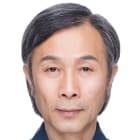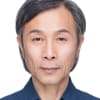commentary Commentary
Commentary: Removal of rising political star reveals murky nature of Chinese elite politics
Chongqing leader Sun Zhengcai has been swiftly removed from his position and placed under party disciplinary investigation. The future for his only cohort mate in the Politburo, Hu Chunhua, is uncertain, says Dr Bo Zhiyue.
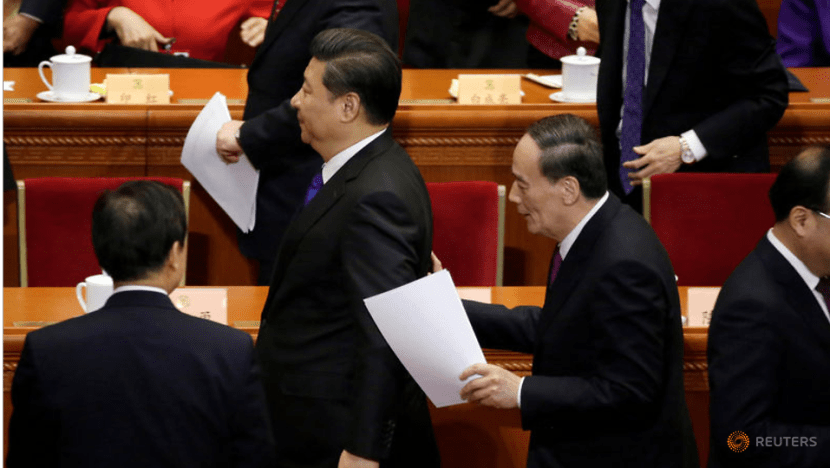
China's Politburo Standing Committee member Wang Qishan, the head of China's anti-corruption watchdog, talks to President Xi Jinping at the Great Hall of the People in Beijing, China, March 3, 2016. (File photo: REUTERS/Jason Lee)
BEIJING: With the removal of Sun Zhengcai, the youngest member of the 18th Politburo of the Chinese Communist Party, Hu Chunhua, its second-youngest, has become the focus of media attention in recent days.
Will Hu Chunhua follow suit? Or will Hu’s position be strengthened as a result of Sun’s removal? Will Hu have any chance of entering the Politburo Standing Committee at the forthcoming 19th Party Congress? What would his portfolio be?
THE RISE AND FALL OF SUN ZHENGCAI
Born on Sep 25, 1963, Sun Zhengcai had been a rising political star in China. With a doctoral degree in agriculture, Sun began his political career in Beijing in 1997. He was appointed by Premier Wen Jiabao as Minister of Agriculture in December 2006 at the age of 43 and was further promoted to party secretary of Jilin in November 2009.
At the 18th Party Congress in November 2012, Sun was made a member of the Politburo. Sun was subsequently transferred to Chongqing as party secretary in November 2012. He had been on track to become a member of the Politburo Standing Committee at the forthcoming 19th Party Congress in the fall of 2017.
On Jul 15, however, Sun was suddenly dismissed as party secretary of Chongqing. Sun is still listed as one of the 25 Politburo members, but there is no news about his current status or new position anywhere in China.
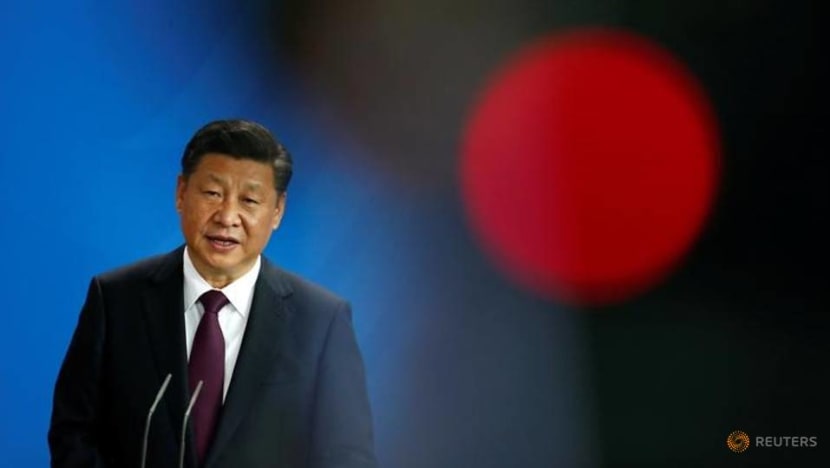
SIGNS THAT SUN IS UNDER HOUSE ARREST
There are signs that Sun has been placed under house arrest since Jul 14.
First, Xinhua News Agency announced the reshuffle of Chongqing’s and Guizhou’s party secretaries in the morning of Jul 15. However, when Zhao Leji, a member of the Politburo and director of the Central Organisation Department, made the announcement that Sun was no longer concurrent party secretary of Chongqing at a meeting on the same day, Sun was absent from the meeting.
Second, Sun apparently attended the Fifth National Financial Work Conference held in Beijing from Jul 14 to 15.
Wearing a long-sleeved blue shirt very similar to the one he wore during his inspection tour of Chongqing on Apr 16, 2014, Sun was probably seated between General Xu Qiliang, a member of the Politburo and vice-chairman of the Central Military Commission who wore a short-sleeved blue shirt that day, and Li Yuanchao, a member of the Politburo and vice-president of the People’s Republic of China, who wore a short-sleeved white shirt that day.
But in the CCTV report at 7.18pm on Jul 15, Sun’s image was edited out. Between Xu Qiliang and Li Yuanchao, there is only a small trace of an arm poking out of a long-sleeved blue shirt.
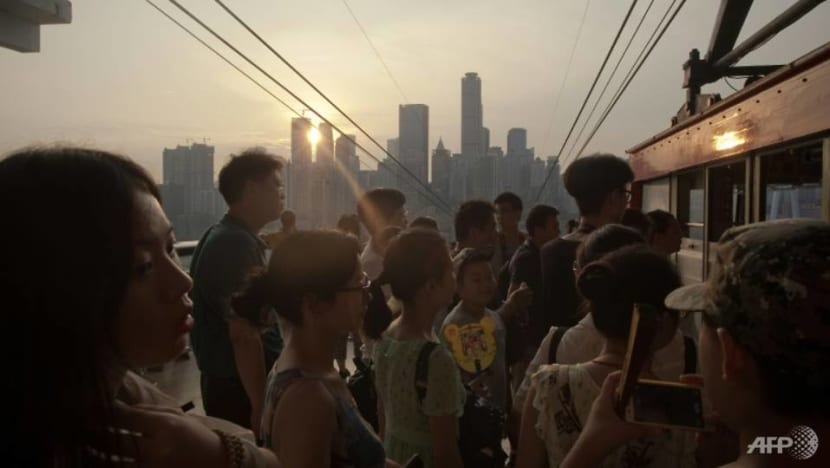
These are not good signs for a current member of the Politburo. It is no longer a matter of whether Sun is in trouble. It is a matter of when the disciplinary action against Sun will be officially confirmed.
On Jul 24, Xinhua announced that Sun has been placed under investigation for suspected serious breaches of party discipline.
WILL HU CHUNHUA FOLLOW SUIT?
Since Hu Chunhua, born in April 1963, has been groomed along with Sun Zhengcai as the frontrunners of the sixth-generation leadership in China, what is the implication of Sun’s removal for Hu Chunhua? Is it possible that Hu will be the next Politburo member to be dismissed?
The answer to this question depends on how we interpret the removal of Sun Zhengcai. There are two main theories about Sun’s removal.
One theory concerns secretary of the Central Commission for Discipline Inspection Wang Qishan’s personal revenge. Since Sun had sided with Wang’s rival in Beijing when both Sun and Wang were working in the capital, the theory is that Wang has finally decided to retaliate against Sun.
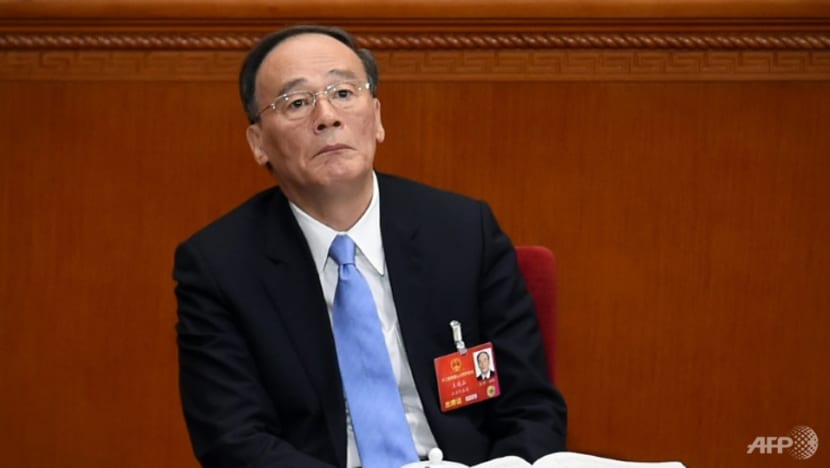
Sun had worked as a standing member and secretary-general of the Beijing Municipal Party Committee from November 2002 to December 2006, and his boss then was Liu Qi, a Politburo member and party secretary of Beijing. Wang Qishan, who was acting mayor and mayor of Beijing from April 2003 to November 2007, reportedly did not get along with Liu Qi.
The theory is that Wang had removed Sun in seeking personal revenge against Liu Qi and his supporters. Under this theory, the fact that the Central Inspection Group issued a criticism that Chongqing faced serious problems under Sun’s leadership in February 2017 was simply a cover for this act of personal revenge.
A second theory is that Sun was removed by Xi Jinping as a pre-emptive measure against the Jiang Zemin faction. Under this theory, Sun belonged to the former president of China Jiang Zemin's faction.
Sun was initially recommended to Jiang by Jiang’s cousin Jiang Zehui, former president of the Chinese Academy of Forestry, and was later promoted by Jia Qinglin and Liu Qi, members of the Jiang Zemin faction. Sun had been groomed to be the future leader of China by Jiang, eventually replacing Xi Jinping.
Fortunately for Hu Chunhua, neither of these theories are applicable in his case. He has not worked with Wang Qishan previously. He is also not a member of the Jiang Zemin faction by any means.
But we cannot rule out the possibility that Hu may be removed before the 19th Party Congress. As a potential successor to Xi, Hu’s presence in China's future leadership would undermine Xi’s argument for staying on beyond the 20th Party Congress in 2022.
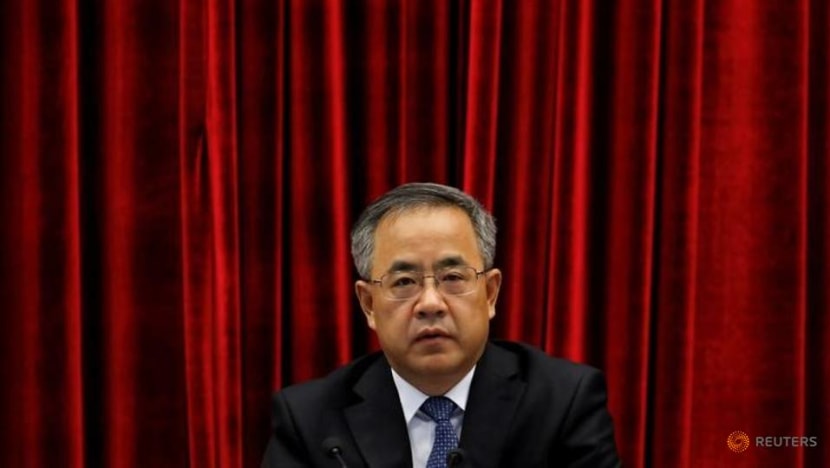
HU CHUNHUA’S PROSPECTS AT THE 19TH PARTY CONGRESS
Theoretically, with Sun's departure, Hu Chunhua is less likely to be removed. It would be too costly for either Wang Qishan or Xi Jinping to remove the two youngest members of the 18th Politburo before the 19th Party Congress.
Other political elites would perceive this as a sign of a power struggle instead of a necessary anti-corruption measure. In this sense, Sun’s removal has made Hu’s position more secure.
There are no signs that Hu Chunhua is in any trouble. In contrast to Wang Qishan’s critical assessment of Sun’s work in Chongqing, Hu’s work has been endorsed by Xi Jinping. In April 2017, Xi Jinping praised Guangdong for its achievements under Hu's leadership.
There are two possibilities for Hu Chunhua at the 19th Party Congress. One is to follow the example of Wang Yang, his predecessor as party secretary of Guangdong. Under this scenario, Hu would be allowed to remain as a Politburo member but not permitted to enter the Politburo Standing Committee.
He could succeed Wang Yang as vice-premier, who in turn could replace Zhang Gaoli as executive vice-premier of the State Council and a member of the Politburo Standing Committee.
He could also succeed Li Yuanchao as vice-president of the People’s Republic of China without any additional portfolios.
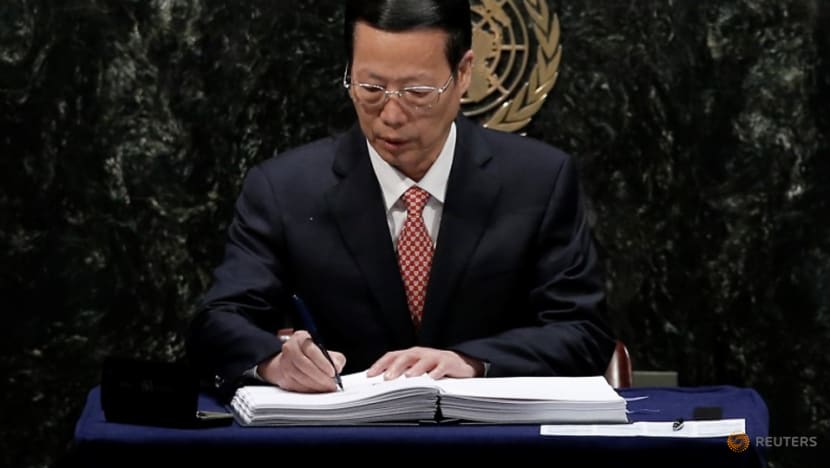
Alternatively, Hu might be allowed to enter the Politburo Standing Committee at the 19th Party Congress. Depending on the distribution of powers among members of the 19th Politburo Standing Committee, Hu might be given different sets of portfolios.
He could replace Zhang Gaoli as executive vice-premier of the State Council, Liu Yunshan as the man in charge of propaganda affairs and the Central Party School, or Yu Zhengsheng as chairman of the Chinese People’s Political Consultative Conference.
But it is hard to imagine that Xi Jinping would want Hu Chunhua to have such extraordinary powers and risk Hu being seen as his own replacement so soon, at the 19th Party Congress.
If Xi allows Hu to become a member of the Politburo Standing Committee, this would not necessarily be the case because of Hu’s qualifications and credentials but because of Xi’s tolerance.
Due to the murky nature of China’s elite politics, it is difficult to make any predictions about the 19th Party Congress. There is no guarantee that any of the potential candidates for the next Politburo such as party secretary of Tianjin Li Hongzhong, party secretary of Beijing Cai Qi, party secretary of Xinjiang Chen Quanguo or party secretary of Chongqing Chen Miner will eventually make it to the Politburo.
Nor is there any guarantee that the remaining members of the 18th Politburo will not be removed for corruption or political charges.
Dr Bo Zhiyue, a leading authority on China’s politics, is founder and president of the Bo Zhiyue China Institute, a consulting firm providing services on China to heads of governments and CEOs of multinational corporations.








